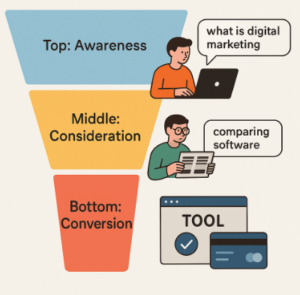The “0 or 1” Trap: Why High-Competition Keywords Might Yield Zero Results (And What To Do Instead)
In the world of digital marketing, success hinges on understanding how to guide potential customers through the sales funnel—from initial awareness to final conversion.
A critical piece of this puzzle is keyword research(topics research), which dictates how visible your content is to the right audience. But not all keywords are created equal.
Some promise quick conversions but are fiercely competitive, while others offer a slower burn with less resistance. This is where the “0 or 1” concept comes into play—a simple yet powerful framework for evaluating the real-world impact of your keyword strategy.
Let’s dive in and uncover how mastering these concepts can transform your SEO strategy.
What Exactly is the Sales Funnel?
The Sales Funnel and Keyword Dynamics
The sales funnel represents the customer journey: awareness at the top, consideration in the middle, and conversion at the bottom. Keywords align with these stages, and their role shifts depending on where a prospect is in the funnel.
- Top of the Funnel (Awareness): These keywords are broad and informational—think “how to improve productivity” or “what is digital marketing.” They attract people who are exploring a topic, not necessarily ready to buy. Competition here is often lower because the intent is less commercial, and the audience is wider.
- Middle of the Funnel (Consideration): Keywords like “best productivity tools” or “digital marketing software reviews” signal that users are researching solutions. Competition increases as businesses vie for attention from prospects narrowing their options.
- Bottom of the Funnel (Conversion): Keywords such as “buy productivity software” or “digital marketing tool discount” are laser-focused on purchase intent. These are the holy grail of conversions—but they’re also the most competitive, with brands battling to rank for terms that promise immediate sales.

The closer a keyword is to conversion, the shorter the time frame to close the deal. A bottom-of-the-funnel keyword might convert in days or even hours, while an awareness-stage keyword could take weeks or months to nurture a lead into a customer. But here’s the catch: proximity to conversion comes at a cost—higher competition.
Why High-Competition Keywords Feel Like a Lottery
Imagine you’re new to running, and you’ve signed up for a big race. Would you pick a marathon against seasoned pros, or start with a smaller fun run?
High-competition keywords are like jumping into that marathon unprepared. You could spend months on them and still never rank—ending up with zero visibility and zero sales. Ouch.
Introducing the ‘0 or 1’ Concept
The “0 or 1” concept is a binary lens for assessing keyword viability.
It’s about asking: Will this keyword deliver results (1), or will it leave me with nothing (0)?
Ranking on the first page of search results is the gateway to visibility, but competition determines whether you get that coveted “1” or end up with a “0.”
High-Competition Keywords (Bottom of the Funnel): Terms close to conversion are crowded with established players—big budgets, optimized sites, and aggressive SEO tactics. If you’re a smaller player or new to the game, ranking for “buy CRM software” might be near impossible. Even though the conversion time frame is short, the likelihood of ranking could be so low that your effort yields zero conversions. In the 0 or 1 framework, this is a “0”—all potential, no payoff.
Low-Competition Keywords (Top of the Funnel): Awareness-stage keywords like “how to manage customer relationships” face less resistance. They’re easier to rank for, giving you a “1” in terms of visibility. The trade-off? Conversion takes longer as you nurture leads through the funnel. But that “1” means you’re in the game, building trust and authority over time.
This concept simplifies SEO outcomes into two simple possibilities:
- 0 (No rank): Your keyword doesn’t appear on Google’s first page, so practically no one sees it.
- 1 (Rank achieved): Your keyword ranks, drives traffic, and opens the door to conversions.
Here’s why this matters:
Even a powerful conversion keyword can yield zero results if it’s too competitive. But a simpler, awareness-focused keyword could easily give you a “1”—meaning visibility, clicks, and eventually, conversions.
The Power of Targeting Less Competitive Keywords
You might wonder, “But if these keywords don’t immediately sell, why bother?”
Think of awareness-stage keywords like planting seeds. Sure, they won’t bloom overnight, but they’re easier to grow. With nurturing content, these visitors eventually become loyal customers ready to buy from you specifically.
Striking the Balance: Strategy Meets Reality
So, how do you turn keyword research into a winning sales funnel strategy? It’s about balancing competition, intent, and your resources. Here’s a practical approach:
- Start with Awareness Keywords: Target low-competition, top-of-the-funnel terms to secure early wins. These “1s” build your site’s authority and attract an audience you can nurture. Use content like blog posts, guides, or videos to address pain points and establish credibility.
- Bridge to Consideration: As your authority grows, layer in mid-funnel keywords. These might still be competitive, but ranking becomes more feasible with a foundation of traffic and backlinks from your awareness efforts. Offer comparisons, case studies, or webinars to move prospects closer to a decision.
- Test the Conversion Waters: Reserve bottom-funnel keywords for when you’ve got the bandwidth to compete—or find niche, long-tail versions (e.g “‘affordable CRM for small business” instead of “buy CRM”). These can still deliver quick conversions with less resistance, tipping the odds toward a “1.”
Quick Example:
If you sell organic skincare products, targeting “buy organic face cream Malaysia” might sound perfect but could be ultra-competitive.
Instead, start with “benefits of organic skincare.” Easier ranking here builds trust, traffic, and eventually funnels visitors toward a purchase.
Watch Out for This Common Mistake!
The Long Game vs. The Quick Win
The 0 or 1 concept forces us to confront a truth: not every keyword is worth chasing. A highly competitive, conversion-ready term might sound appealing, but if you can’t rank, it’s a “0”—wasted time and effort. Meanwhile, a less glamorous awareness keyword could be your “1,” setting the stage for sustainable growth.
Think of it like planting seeds. Bottom-funnel keywords are like betting on a single, heavily contested fruit tree—great if you can claim it, but risky. Awareness keywords are like sowing a field: slower to harvest, but with enough care, you’ll reap rewards over time. The best strategies do both—securing quick wins where possible while cultivating a pipeline for the future.
Don’t fall into the trap of chasing only high-intent keywords without considering your site’s current SEO strength. It’s tempting, but it’s a recipe for frustration. Build momentum first, then reach for the competitive stars.
Wrapping Up: Balance is Key
Keyword research isn’t just about search volume or intent—it’s about what’s achievable within the sales funnel. By applying the 0 or 1 concept, you can prioritize keywords that deliver real results, whether that’s immediate conversions or long-term visibility. Start with the “1s” you can win today, and build toward the tougher battles tomorrow. In a world of infinite keywords, success lies in knowing which ones tip the scales from 0 to 1.

Nabil Jalil
Accelerating Sales & Growth for Startups & SMBs | CEO @ BlackGrid | Co-Author of "Money Matters" | SEO Consultant | Based in Los Angeles 🇺🇸 & Kuala Lumpur 🇲🇾
